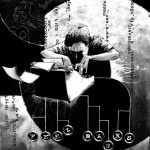By Feet Banks
September 14, 2014
 When young writers talk about writing the conversation often goes like this:
When young writers talk about writing the conversation often goes like this:
“Oh yeah, I’ve read your shit… it’s good. I’m working on a bunch of new stuff too.”
Even when we’re being complimentary: Yours is “shit”, mine is “stuff”. It doesn’t seem like the kind of attitude that fosters collaboration. And while that vortex of paranoia and self-doubt known as the creative process can certainly be a lonely place, do I really want to bring someone else in there to assist as I mine my soul for epiphanies? Is it easier to shed light on the human condition when there’s someone else trudging along through your psyche?
Most writers are narcissistic by default so image is important too. It’s a much more romantic vision to picture oneself alone, hammering away at the machine and tearing line after line of golden prose from the ever-encroaching abyss.
Yee Haw, that sounds great but if you’re taking your writing seriously it’s only half the story. More often than not, once that first little splooge of sloppy genius hits your page/screen the writing gets awfully collaborative and far less romantic. There are workshops (which are fantastic so long as everyone is willing to dish it out and take it just as hard) or editors (assholes, but necessary if you ever want to get paid) the spouse (an undervalued literary asset) or the readers themselves (the most important collaboration of all).
And yes, sometimes two writers working together can produce something where the sum is more than the parts. The Dragonlance Chronicles are a good example (especially if you’re a 14-old-boy) and film is so collaborative that a co-authored screenplay is almost the norm. My favourite literary collabs these days, however, are almost always Rock n’ Roll memoirs. The formula works like this:
Take one (or more) whiskey-and-drug soaked rock gods, add a proficient wordsmith who’d rather tell someone else’s story and strap in for all kinds of kick-ass book-reading awesomeness. Bonus points if the memoir is told in “Oral History” format, where multiple voices recollect the same events from unique points of view.
Granted these music memoirs are non-fiction and I’m a sucker for anything with Flying V guitars and groupies, but besides entertaining and enlightening these oral histories also offer an incredible approach to story telling
Four rock stars can recollect the exact same event and come up with very different versions of what occurred. It works with Rock n’ Roll history because life was fast, egos are large, and memories are often hazy. Following multiple characters over the course of an entire book of smoky memories, big egos, and ulterior motives makes for a more interactive reading experience. You think more, you follow more closely, and most fun of all— you get to choose sides.
As a reader, these Rock n’ Roll oral histories are a glimpse into the depths of a real world most of us will never enter—it’s great stuff. As a writer, the Oral History structure and style offers new ideas and valuable insights that can help make your own shit better.
Rock on, write hard.
– Feet Banks
Recommended Reading
(Dan at Armchair Books in Whistler will have these and if not he’ll bring them in for you. Hit up Armchair Books)
The Dirt — Confessions of the World’s Most Notorious Rock Band
By Vince Neil, Nikki Sixx, Tommy Lee, Mick Mars (aka Motley Crue) and Neil Strauss
The only book I’ve ever finished, put on the nightstand, went to sleep, woke up and started again.
http://www.motley.com/the-dirt-motley-crue-ebook-release/
Please Kill Me — The Uncensored Oral History of Punk
By Legs McNeil and Gillian McCain
A bit more in depth than most people want to go. But this one is gold when you run into the dude at the cocktail party trying to tell you how punk rock started in England.
BONUS! Fiction and film versions of the same Oral History concept:
“In a Grove” by Ryūnosuke Akutagawa. (Short Story)
Rashomon by Akira Kurosawa (Film)
Just a nice entertaining way to realize everything is relative and us humans are unable to understand or communicate a single, pure truth. (Which is good news if you are a storyteller.)
Events
Reading Event 5: Comedy Writers’ Lunch with Grant Lawrence, Charlie Demers, Grant Buday and Luba Goy Moderator: Feet Banks
